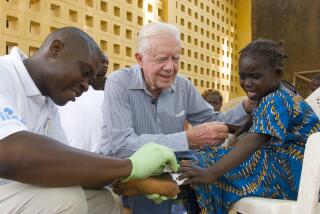Reviewing the 25 years of a killer
- Share via
To mark the 25th anniversary of the first diagnosed cases -- an event, or rather cluster of events, that occurred in this very city -- the PBS news documentary series “Frontline” presents “The Age of AIDS,” a four-hour look back at how a disease not casually transmitted became a deadly pandemic, and all the things we have done to help it on its way. It’s a big and of course ongoing story, of human folly and greed and ego but also of hard work and selflessness, and four hours does not seem too long a time to take to tell it.
Twenty-five years is brief in the history of disease, but in the course of individual human affairs, it’s long enough that many will not recall a world without AIDS. (It’s estimated that the virus jumped from primates to humans in the 1930s, but it took it half a century to get out of Africa and into the medical journals.)
Though it’s become the stuff of modern culture, of art, of movies and plays and paintings, of coalitions and confrontations, red ribbons and celebrity fundraisers, the fact that it has been around awhile also grants us a kind of license not to think seriously about it. Even as the numbers of the sick and dead continue to multiply, mostly in the Third World, AIDS in this country has achieved a kind of transparency -- more so as medical strategies have been developed to keep the infected alive, and as new infections here increasingly favor the poor.
So it is useful to be reminded, and to remember. “The Age of AIDS” recalls the virus’ first flush, as what’s first seen as a “gay disease” asserts itself as an equal opportunity destroyer and there’s panic in the streets. (You were told that you’d slept with everyone that anyone you’d slept with had ever slept with, which could make even a minimally sexually active person tremble.) Hemophiliac kids, sick from transfusions of tainted blood, were forced from schools; televangelists claimed to see the punishing hand of God at work; friends were lost, jobs put in jeopardy.
These were fears that Ronald Reagan, the first AIDS-era president, did little to allay -- first by not speaking of it all, and finally, in his single address on the subject, sending at best a mixed message. But he was not alone among leaders whose personal delicacy, ideology or political ends kept them from seeing the problem straight. (Former British Prime Minister Margaret Thatcher gets good marks for supporting a needle-exchange program, as does Uganda’s President Yoweri Museveni for his successful “ABC” program -- for “Abstinence,” “Be Faithful” and, barring that, to use a “Condom” -- which brought his country back from the brink of disaster. “I could not keep quiet on this,” says Museveni. “Any other option would have been murder, would have been criminal.”)
Like most “Frontline” documentaries, this seems an especially well-reasoned and reasonable work -- alarming, but not alarmist, cogent and clear. Though its main purpose is to track the sociopolitical progress of the disease as it has bumped up against political inaction, bad policy, religious mania, corporate greed and widespread parochialism, it’s also an effective primer on AIDS itself, what it is, how it works and why it’s hard to treat.
Filmed all over the world, it combines a quarter century of archival footage with a granted wish list of talking heads, including the doctors who first noticed and defined the disease, activists who have helped change the nature of the discussion and government officials up to and including former President Clinton. And Bono, of course. (The “Frontline” aura of accuracy is helped in no small part, as always, by resident narrator Will Lyman, the vocal personification of concerned rationality.)
It is a portrait of maddening foolishness of many sorts, as a story of a 100% preventable disease that has already killed 22 million people would have to be. Yet it’s also inspiring and moving -- a tale as well of people working hard against the disease, looking for a cure, or shaking loose money, or tending to the sick. Some have it themselves, some know someone who does, or who died from it, and some are just people who care.
AIDS is not, by any account, going away soon, but the picture, for all that, is not hopeless.
*
‘Frontline: The Age of Aids’
Where: KCET
When: 9 to 11 tonight and Wednesday night



